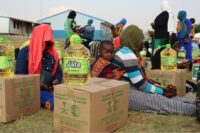UUCSA Meets SA Intelligence Services to Discuss Kidnappings & the Impact on the Muslim Community
The United Ulama Council of South Africa (UUCSA) has met with South African intelligence service to discuss the spate of kidnappings in the country and the impact on the Muslim community including the lack of confidence in the police to deal with the scourge.
Kidnappings have increased significantly in South Africa with a number of high profile businessman and children being abducted for exorbitant ransom demands.
Last month Police Minister Bheki Cele when announcing the latest crime statistics for the second quarter of 2021/2022 revealed that there have been over 2,000 kidnapping cases reported to the police between July to September 2021.
Gauteng lead with a total of 729 kidnapping cases, followed by KwaZulu-Natal with 407.
In a statement, UUCSA’s Ml Yusuf Patel says they discussed a number of issues with the intelligence services which was attended by Lieutenant General LE Ntshinga and Major General Feroz Khan.
- Corruption within the ranks of the security cluster has added to the spike in kidnappings in South Africa and has hindered investigations.
- Investigations pertaining to kidnappings has now been made a priority within the unit
- Appropriate resources have been budgeted to tackle the scourge
- Whilst some syndicates operate at an international level with very high level of sophistication, there are other syndicates that target the middle income level earners who make use of ’embedded scouts’ located at different levels to identify potential victims. There are also opportunistic groups that operate within the informal business sector demanding protection fees failing which they resort to kidnapping as a bargaining tool.
- Kidnapping is oftentimes not an isolated crime but is linked to a host of other crimes such as the illegal firearms trade, vehicle theft, drugs smuggling, police corruption and money laundering.
- The Security cluster’s recent success in busting these syndicates was made possible by the cooperation of family and community members. In instances where members of the family or community refuse to cooperate with the police, the ability of the police to deal with the situation was significantly compromised.
Ml Patel says representatives from the security cluster have appealed to the community to remain vigilant and have undertaken to convene further meetings at a provincial level with a view to reassure the community that the Security Cluster is giving the requisite attention to this scourge.









